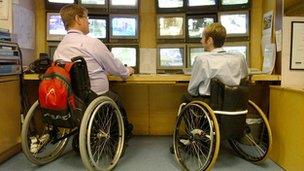Remploy factory closures: Thousands face life without work
- Published

The factories were established 67 years ago as part of the creation of the welfare state
Thousands of disabled people could face permanent joblessness as the final "sheltered" employment factories close.
"I just want to work. I'd do anything, I'd sweep the floors, I'd wash toilets out. I would do any job just to do my bit for the community."
Simon Huntington worked for 17 years at the Remploy factory in Spennymoor near Darlington. Since the packaging and assembly plant shut in August last year, Simon has found it impossible to secure a new job.
"I'm scared I won't get another job. I've applied for loads of jobs. Interviews come, interviews go and I never get anywhere further. It doesn't matter what I do, no-one wants to employ me as they can see Remploy on my CV," he says.
Simon, who has osteoporosis, spondylosis and double vision, is one of nearly 1,500 disabled people made redundant from the Remploy factories last year in the latest round of closures.
The Department for Work and Pensions says it is aware of 351 who have found new jobs - that is fewer than a third. Many of the workers say they feel like sacrificial lambs who are paying the price for a government principle.
'Spider's web'
The Remploy factories were set up after World War II to provide work for serviceman and civilians who were injured and disabled.
For nearly 70 years the factories provided sheltered, paid work for thousands of people with disabilities - doing things like making radiation protection suits for the Army, wheelchairs for the NHS and furniture for schools.
.jpg)
Ray Ludford has been unable to find work
As recently as five years ago, 83 of the original 92 factories were still in business. But by the end of this year all will have been closed or sold-off and more than 3,500 disabled people will have lost their jobs.
It was the then Labour government, in 2008, that began the closure programme by sifting out factories which it deemed commercially unviable. Twenty-nine were shut down as a result.
A total of 1,600 workers lost their jobs and Remploy is aware of fewer than 200, or 12%, who are in new employment.
Ray Ludford is not one of them. He spent eight years working at the Brixton Remploy factory in south London. Ray, who has cerebral palsy, says life has been a struggle since.
"The main problem with being out of work and on a low income is that you're in a permanent state of anxiety, you can't plan, you can't take risks, you can't go forward," he says.
"It does destroy you because it's like being trapped in a spider's web - you can't get out."
'In tears'
But Ray is not alone in fearing he will never find another job, and the unemployment figures among ex-Remploy workers would seem to suggest he is right.
He says: "There is now such a level of unemployment and because I've deteriorated physically in the last 10 years, I don't think there's much realistic chance of me doing a conventional job again."
Kevin Hepworth, lead officer on Remploy for the Unite union, told BBC Radio 4's Face The Facts programme: "It's an absolute shambles, we see members in absolute tears.
"I had one guy, he couldn't believe it, we'd put up a good fight, we'd put forward all these sensible arguments about why the factories should stay open and he just sat there and said 'This government is just not listening to us are they?' and he just burst into tears on my shoulder - he's not unique.
"Members are saying we've been dumped for life. They had a great pride in their product and this government has just yanked that away from them and says no you're going on the scrapheap."
These days it is regarded as old-fashioned to have disabled people tucked away in sheltered, subsidised employment when they could be working alongside everyone else.
Also, the government believes the £63m pounds a year it spends on Remploy could be better spent supporting more disabled people into work.
Minister for Disabled People, Esther McVey, says "a fifth of the entire budget for specialist disability employment services was going into failing factories.
"With 6.9 million disabled people of working age… what we need to do is help the individuals, protect the budget for disability employment support and help the person not a failing factory," she says.
.jpg)
Simon Huntington said he was worried about the future
However, Liz Sayce, the chief executive of Disability Rights UK, who led the coalition review which prompted the factory closures, says the government needs to go "much further and much faster" to help more disabled people into work.
As Simon Huntington gazes around his modest terraced house in Shildon, County Durham, he is fearful of the future.
"This house is thanks to Remploy. My car is thanks to Remploy. My whole life at the moment is thanks to Remploy - and now that's gone, my life is gone," he says.
"I'm so proud I worked for Remploy and I will continue saying that.
"Remploy was a lifesaver. Remploy was my life."
Face the Facts investigates the closure of the Remploy factories on Wednesday 15 May at 12:30 BST on BBC Radio 4.
- Published29 April 2013
- Published26 February 2013
- Published18 January 2013
- Published6 December 2012